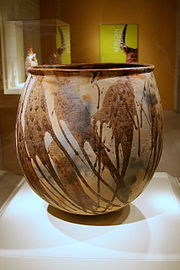- Decoction
-
Decoction is a method of extraction, by boiling, of dissolved chemicals, or herbal or plant material, which may include stems, roots, bark and rhizomes. Decoction involves first mashing, and then boiling in water to extract oils, volatile organic compounds, and other chemical substances.[1] The process can also be applied to meats and vegetables to prepare bouillon or stock.[2]
 Large ovoid vessel made by a Chewa woman and fired at a low temperature. The potter achieved the aesthetically vibrant surface by splashing a vegetable decoction on the body immediately after firing
Large ovoid vessel made by a Chewa woman and fired at a low temperature. The potter achieved the aesthetically vibrant surface by splashing a vegetable decoction on the body immediately after firing
A decoction is also the name for the resulting fluid. Decoctions differ from most teas, infusions, or tisanes, in that they are usually boiled. The term is used colloquially in South India to refer to black coffee prepared by the traditional method.[citation needed]
Contents
Etymology
The term dates back to 1350–1400[3] from present participle stem of Latin decoquere (meaning to boil down), de "from" + coquere "to cook".[4]
Use
In brewing, decoction mashing is the traditional method where a portion of the mash is removed to a separate vessel, boiled for a time and then returned to the main mash, raising the mash to the next temperature step.
In herbalism, decoctions are usually made to extract fluids from hard plant materials such as roots and bark.[citation needed] To achieve this, the plant material is usually boiled for 8–10 minutes in water. It is then strained.
See also
References
- ^ Biology-online.org
- ^ Courtine, Robert J.; et al., eds (1988) [French edition published 1984]. Larousse Gastronomique (English ed.). Paul Hamlyn. p. 362. ISBN 0-600-32390-0.
- ^ Dictionary.reference.com
- ^ Etymonline.com
External links
- How To Make a Herbal Decoction from unexplained.net
Cooking techniques Dry ConductionConvectionRadiationWet High heatLow heatIndirect heatFat-based High heatBlackening · Browning · Frying (Deep frying · Pan frying · Shallow frying · Stir frying (bao)) · SautéingLow heatGentle frying · SweatingMixed medium Device-based Non-heat See also Categories:- Horticulture and gardening
- Herbalism
Wikimedia Foundation. 2010.
